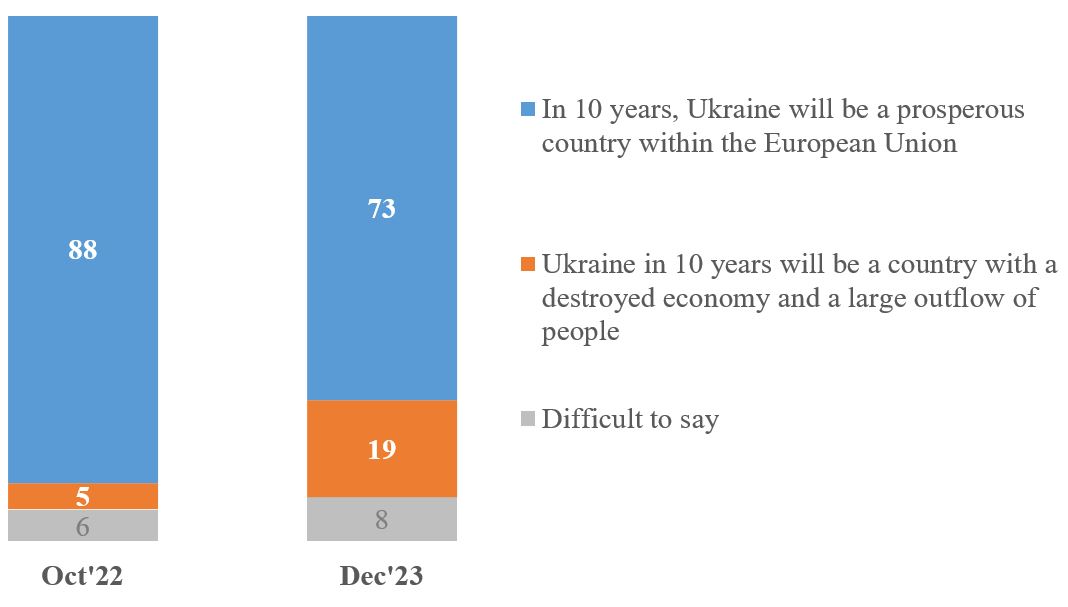From November 29 to December 9, 2023, the Kyiv International Institute of Sociology (KIIS) conducted its own all-Ukrainian public opinion survey "Omnibus".
The year 2023, like the previous year 2022, was extremely difficult for Ukraine and Ukrainians. Some expectations and hopes did not come true, and by the end of the year pessimistic voices could be seen or heard more and more often in the public space (both in Ukraine and among Western allies). In October 2022, we asked Ukrainians how they see the future of Ukraine. Now, in December 2023, we asked this question again, to understand how the views of Ukrainians have actually changed.
We are really observing the growth of pessimistic moods (from 5% to 19% there were more people who believe that in 10 years Ukraine will be a country with a destroyed economy and a large outflow of people). However, the vast majority of Ukrainians (73%) still believe that in 10 years Ukraine will be a prosperous country within the EU (in October 2022, there were 88% of such).

In all regions, the majority of the population believes that in the future Ukraine will be a prosperous country within the EU. Relatively few of them are in the East, where 67% have optimistic views (and pessimistic views are shared by 25%). In other regions, 73-76% are optimistic about the future of the country (16-19% are pessimistic).

Regardless of age, the majority of Ukrainians are optimistic about the future. However, it is worth noting that younger respondents were a little more pessimistic. In particular, among respondents aged 18-29, 68% are optimistic about the future of Ukraine in 10 years, and 26% are pessimistic.

A. Hrushetskyi, comments on the survey results:
As with the other tangential public moods we discussed earlier, it was natural to expect that after a significant spike, the level of optimism would eventually decline. At the same time, currently the level of optimism actually remains at a fairly high level (taking into account all the trials that Ukraine and Ukrainians are going through).
We would like to remind once again that often the subjective perception of the situation has a stronger influence on the consequences than the objective circumstances. The Afghan army, trained and equipped with the support of the United States, could appear to be a much stronger opponent by objective standards than the Taliban. However, greater subjective confidence in their own strength gave the Taliban the opportunity to take over the entire country very quickly. There is an example much closer to Ukraine - we ourselves. If to recall January-February 2022, it looked like the West's farewell ceremony for Ukraine. All objective comparisons were absolutely not in favor of Ukraine, and only the Ukrainians themselves believed in the possibility of repelling the attack. And Ukraine not only withstood, but also managed to liberate a significant part of its territories and eventually gain the prospect of European integration.
We cannot afford to underestimate Russia, which retains the potential to inflict great suffering on Ukraine. For society, this or that image of the future is not a simple assessment of the probability of certain events (as in forecasting, for example, the trajectory of the planet). For society, forecast and plan are interconnected, confidence in one or another version of the development of events brings these events closer or further away. An optimistic vision of the future supports us and gives us strength to punish the aggressor.





















